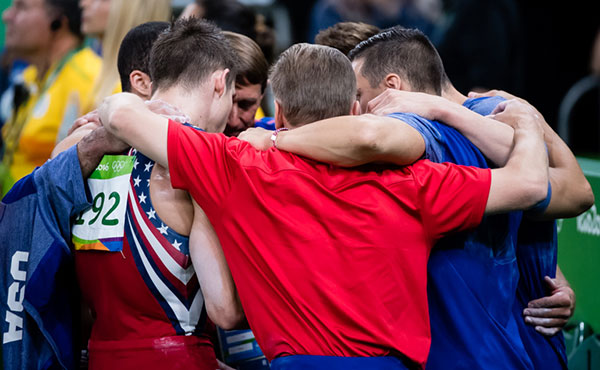
By Jo-Ann Barnas, Special contributor
RIO DE JANIERO – The result was the same, but everything else about it was different.
That’s what Sam Mikulak was saying shortly after the U.S. Olympic men’s gymnastics team finished fifth in team finals Sunday at the Rio Olympic Arena, duplicating the same spot as their predecessors four years ago in London.
“We got off to a slow start, but, you can’t compare teams,” he said. “Nothing about this was the same.”
Mikulak should know. The four-time national champion was part of that 2012 team, along with Jake Dalton and Danell Leyva. Together, with first-time Olympians Chris Brooks and Alex Naddour, they were trying to become the first U.S. team to medal since winning bronze in 2008 in Beijing.
“We got momentum going and it looked like we were going to make that come back,” Mikulak said. “But it was a little bit too late. This one feels different because I know that everyone of these guys trained every single day with so much heart and so much purpose. We couldn’t have done anything differently; we just didn’t have the day we wanted to have today. In 2012, after (pommel horse), we just diminished. This time, we felt a lot more heart and a lot more passion out there.”
It was a glorious afternoon for Japan, who won its first Olympic gold since 2004 with a score of 274.094, with Russia (271.453) and defending Olympic champ China (271.122) taking silver and bronze. For sure, it was an emotional victory for Japanese men’s star Kohei Uchimura, six-time world champion and defending Olympic all-around gold medalist, who had said that he coveted team gold more than any individual honor.
For the Americans, they just couldn’t get it going from the get-go, matching the same slow start that foiled them in 2012, when they were in seventh after the first two rotations and needed to play catch up the rest of the way. Similar to four years ago as well was that the U.S. took a high ranking into the team final; the Americans were second in qualifying Saturday, compared to holding the top spot in London.
So what happened that leaves the U.S. still looking for its first international team medal since 2014, when they collected bronze at Worlds under Mark Williams, who’s their Olympic coach in Rio?
“We tried to fix the individual mistakes from four years go,” Williams said. “At times, I was frustrated that we weren’t getting there fast enough, but we were getting on track. In a lot of ways, these guys performed better than I feel we did in London. We fought through everything and there was no giving up.
“You can allow yourself to be overwhelmed by the moment. And when you go into the medal round, obviously – three up and three count – there’s no opportunity for error, so you want to be feeling like you want to be perfect and that’s a difficult task in a sport that’s as difficult as we have. I felt we were ready. I saw in the training that these guys were hitting routines. It should be as easy as that – do as you did in training. But it can be a whole different challenge.”
For certain, the U.S. put itself in a hole from the start, ranking last after the first rotation among the eight teams. Naddour opened on floor exercise, falling on his final tumbling pass. Mikulak wasn’t clean either, stepping out of bounds twice, leaving Dalton to salvage the rotation by posting and clean and solid 15.325 for his routine.
“In my opinion, it maybe was first-event jitters,” said Brooks, the U.S. team captain. “It happens. It’s the Olympic Games. We had high expectations. A little jitters in the legs can do a lot to a routine.”
Team USA made up a little ground on pommel horse and still rings, moving up to seventh. Then momentum began to change for the U.S. on the next event.
When Mikulak hit his vault and punched the air with his fist –with chants of “USA! USA!’’ filling the areana – you could feel the Americans’ luck changing. The crowd roared even more when his score was posted – 15.366 – fueling the next two U.S. gymnasts to perform solid vaults – 15.466 for Dalton and 15.033 for Naddour.
“I just started screaming, started pumping everyone up to make sure they believed in themselves and the training they had put forth for this moment,” Mikulak said.
After four rotations, the USA was now in sixth place with a score of 177.786. In the fifth rotation, parallel bars, Mikulak (15.700), Brooks (15.100) and Leyva (15.533) all performed clean routines. The results pushed them into fifth, .01 away from fourth place occupied by Great Britain, the surprise Olympic bronze medalists from 2012.
On high bar, Mikulak stuck his landing for a 15.000, followed by Brooks. When his 15.108 score flashed on the scoreboard, it had marked the eighth straight routine the Americans had posted with scores greater than 15.
But it ended when Leyva, the reigning World silver medalist on high bar, fell off on a layout near the end of a brilliant routine. Almost motionless, he stared at the mat and gathered himself before finishing his routine with a stuck landing. His score: 14.333.
“It was just my grips,” he said. “I couldn’t hold onto the bar.”
Leyva went over to his teammates to apologize. They would have nothing of it, instead thanking him for fighting through it.
“I’m going to still feel like it was my fault,” he said. “I was the last routine, and I should have hit. But that’s why we’re so close. I went to apologize to them, and they were, ‘No, no, no. We don’t want to hear that. You did everything you could.’”
Even at the end.
On Wednesday night, both Mikulak and Brooks return for the individual all-around final before individual event finals begin this weekend.




